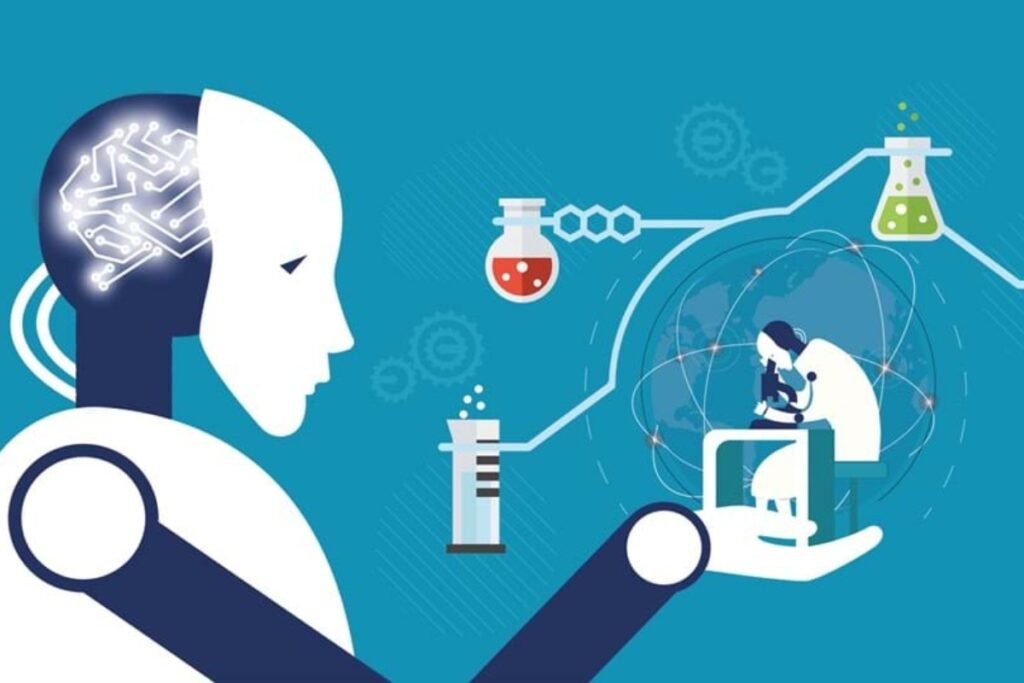The pharmaceutical industry has not been exempt from the revolution that artificial intelligence (AI) has brought about in other industries. AI in Pharmaceutical industry has revolutionized drug research, clinical trials, personalized medicine, and overall healthcare management with its capacity to analyze enormous volumes of data and generate predictions. In this essay, we will examine how AI is significantly changing the pharmaceutical sector and how the field of medicine as a whole.

Introduction to AI in Pharmaceutical industry
AI in Pharmaceutical Industry: The desire for personalized treatment choices, complex clinical trials, and expensive and time-consuming drug discovery procedures have all presented difficulties for the pharmaceutical sector in recent years. Introduction of AI in Pharmaceutical industry has become a potent tool for successfully addressing these problems. In order to get useful insights and support improved decision-making, AI systems can analyze enormous volumes of medical data, including scholarly literature, clinical trials, and patient information.
AI in Drug Discovery
Years of study and testing are often required to create new medications. This method is being transformed by AI algorithms that speed up drug discovery, lower costs, and boost success rates. Machine learning algorithms can pinpoint pharmacological targets, estimate the efficacy of prospective medicinal molecules, and improve molecular architectures. By concentrating their efforts on the most promising therapeutic candidates, researchers may work faster and with less resources thanks to this data-driven strategy.
Enhancing Clinical Trials with AI
Clinical trials are essential for assessing the effectiveness and safety of novel medications. AI algorithms help in patient recruitment for studies, choosing qualified applicants based on predetermined standards, and searching through medical data for possible participants. AI is also capable of analyzing clinical trial data in real-time, identifying adverse occurrences, and enhancing treatment regimens. AI expedites drug development and offers quicker access to cutting-edge medicines by simplifying the trial process.
Precision Medicine and Personalized Treatments
Every person’s genetic make-up and lifestyle choices affect how they react to drugs. Precision medicine, which customizes therapies for specific patients, is made possible by AI. AI systems can find genetic markers linked to illness vulnerability and treatment response by analyzing genomic data. By assisting medical professionals in making the best treatment decisions and reducing unfavorable effects, patients’ outcomes are improved.
AI in Disease Diagnosis and Prognosis
An early and correct diagnosis is essential for illness care that works. Machine learning and image recognition are two examples of AI technologies that have demonstrated exceptional accuracy in the diagnosis of a wide range of ailments, including cancer, cardiovascular disease, and neurological problems. X-rays, MRIs, and CT scans are just a few examples of the medical pictures that AI systems examine to find anomalies and help radiologists make precise diagnoses. Additionally, AI can forecast illness development and prognosis based on patient data, assisting medical personnel in making wise treatment plan selections.
Streamlining Healthcare Operations with AI
AI is crucial in improving healthcare operations, in addition to helping with medication research and diagnostics. Virtual assistants and chatbots powered by AI may arrange appointments, answer common patient questions, and give simple medical advice. These systems are equipped with Natural Language Processing (NLP) algorithms that allow them to successfully comprehend and reply to patient inquiries. Electronic health records (EHRs) are managed more effectively by healthcare practitioners thanks to AI, which also ensures accurate and secure data preservation.
Ethical Considerations and Challenges
Although AI has many advantages, there are also problems and ethical issues that need to be taken into account. When handling sensitive patient information, privacy and data security are top priorities. Building confidence among patients and healthcare providers requires transparent and comprehensible AI models. To maintain fair and equitable health care practices, it is also necessary to reduce the likelihood of bias in AI algorithms.
Future Trends in AI and Pharma
- Utilizing AI algorithms, drug repurposing finds new therapeutic applications for already-approved medications.
- Robotic systems have AI capabilities to speed up experiments and automate lab procedures.
- Machine learning and predictive analytics algorithms to optimize medicine doses for specific patients.
- Clinical decision support systems powered by AI that offer instantaneous therapy suggestions.
- Attempts to stimulate innovation and knowledge exchange among pharmaceutical firms, researchers, and AI developers.
Conclusion
The pharmaceutical sector might undergo a transformation thanks to AI in Pharmaceutical industry, which would enhance drug development, clinical research, personalized treatment, and healthcare administration. Researchers and healthcare workers can speed up innovation, improve patient care, and ultimately save lives by utilizing the potential of AI. Addressing ethical issues and ensuring that AI technologies are used properly and openly are crucial as the field develops.
FAQs
1. How does AI impact drug discovery?
By analyzing enormous volumes of data, forecasting therapeutic efficacy, and improving chemical architectures, AI speeds up the drug discovery process.
2. Can AI improve patient diagnosis?
Yes, by analyzing medical photos and patient data, AI technologies like machine learning and image recognition aid in the correct diagnosis of illnesses.
3. What is precision medicine?
According to a method known as precision medicine, medical treatments are customized for each patient depending on their genetic make-up, way of life, and other aspects.
4. How does AI streamline healthcare operations?
By answering common patient enquiries, monitoring electronic health records, and offering virtual help, AI simplifies healthcare operations.
5. What are the future trends in AI and pharma?
Future themes include the repurposing of drugs, clinical decision support systems, optimized medication doses, lab automation powered by AI, and cooperative innovation initiatives.





























